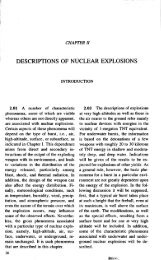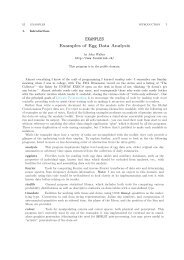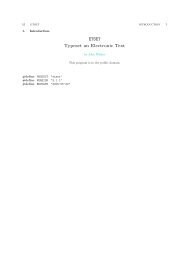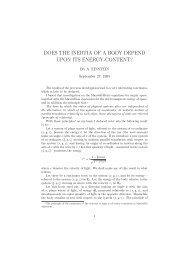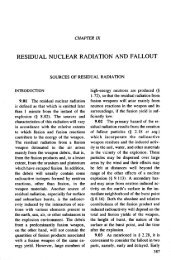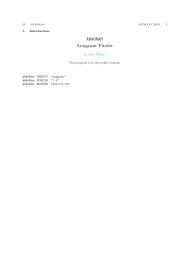The Annoyance Filter.pdf - Fourmilab
The Annoyance Filter.pdf - Fourmilab
The Annoyance Filter.pdf - Fourmilab
You also want an ePaper? Increase the reach of your titles
YUMPU automatically turns print PDFs into web optimized ePapers that Google loves.
222 DEVELOPMENT LOG ANNOYANCE-FILTER §256<br />
installed them as mystrstream−GCC3.h, which is included if GCC3 is defined. I have yet to add the<br />
autoconf logic to detect this; at the moment I’m specifying this when I invoke the Makefile.<br />
An include of the now verboten iostream.h remained in statlib.w; I pulled the “.h”.<br />
In addition, statlib.w ran afoul of the dreaded “implicit typename is deprecated” warning in GCC<br />
3.2. I added the required typename qualifier before constructs such as dataTable < T > ::iterator p<br />
in the methods of dataTable . See section C.13.5 in Stroustrup for details.<br />
Previously, gcc treated the buffer argument of ostream ::write like a C void ∗ pointer. Now one must<br />
explicitly coerce it with a reinterpret cast〈const char ∗〉. <strong>The</strong> same goes for istream ::read , where<br />
the argument must be coerced with reinterpret cast〈const char ∗〉. This played havoc with our<br />
binary I/O code in dictionaryWord and fastDictionary, requiring ugly casts all around. I may go<br />
back and prettify these with a macro, but not before I get the sucker past all the other compile problems.<br />
In days of yore, when everybody knew that an STL vector was just a dynamically sized array, you<br />
were allowed to treat an iterator of the vector as a C pointer to access the contents of the object, as<br />
long as you made sure all references were within bounds: no more. No longer can you, for example,<br />
write the entire contents of a vector〈char〉 to a stream with a single write . Instead, you must painfully<br />
iterate over every element in the vector, doing I/O on each one individually. This is potentially a huge<br />
performance hit which may motivate abandonment of the STL vector in favour of a C array which can<br />
be written in one swell foop. Fortunately, all the cases where this occurs in annoyance−filter are in<br />
exporting fastDictionary objects, which happens so infrequently we don’t care how fast it runs.<br />
Gcc 3.2 also complains if you declare the values of default arguments in a method within a class,<br />
then repeat them in the implementation declared subsequently. I’ve always written code this way,<br />
considering it to better document what’s going on, particularly since the poor sucker who has to fix<br />
the code later on is probably going to be looking at the implementation and may be unaware of the<br />
default argument values declared back in the class definition. Well, it turns out that one can read<br />
section 7.5 of Stroustrup as prohibiting this pursuant to the “default argument cannot be repeated or<br />
changed in a subsequent declaration in the same scope” prescription and, indeed, the example of default<br />
arguments in class methods in section 10.2.3 is coded this way. Okay, what can I do but “fix” it, but to<br />
my mind this reduces the maintainability of the code. I think you should be able to use precisely the<br />
same declaration of the function in its definition and implementation, including default arguments and<br />
attributes such as const. <strong>The</strong> compiler should verify that they’re identical, but then both the definition<br />
and implementation serve as stand-alone descriptions of the calling sequence and method properties.<br />
Oh, come on, guys! Now you’re telling me I have to do a reinterpret cast〈char ∗〉 to istream ::read<br />
into a bloody unsigned char! You can imagine what this did to dictionaryWord ::importFromBinaryFile .<br />
Unfortunately, I not only had to imagine it, I had to do it.<br />
2003 February 16<br />
With gcc 2.96, when you include math.h, it doesn’t define abs for double, as it’s supposed to do<br />
according to section 22.3 of Stroustrup. Consequently, I defined my own abs (double) in the global<br />
context to get the job done. Well, on 3.2.2, the existence of this function creates an overloading ambiguity<br />
against the built-in one, which has now been added to math.h. It turns out that if you include cmath<br />
in 2.96, you do get abs (double), although that file and math.h are documented as being identical. So,<br />
I replaced the include of math.h with cmath and eliminated my private copy of abs . Now it compiles<br />
on both of ’em.<br />
<strong>The</strong>y’ve gone and eliminated fstream ::attach (int fd ) from the standard—just try and plumb a pipe<br />
into your input or output stream the way you effortlessly used to! As a first cut attempt to detour past<br />
this off-ramp to oblivion, I tried building with HAVE_POPEN undefined, and promptly fell into a self-dug<br />
abyss: bad conditional declaration of the file handle used to read compressed mail folders and messages<br />
in mailFolder. I fixed that, and for the first time, we actually built and passed “make check” under<br />
3.2.2! Just don’t try it with compressed mail folders quite yet. . . .





